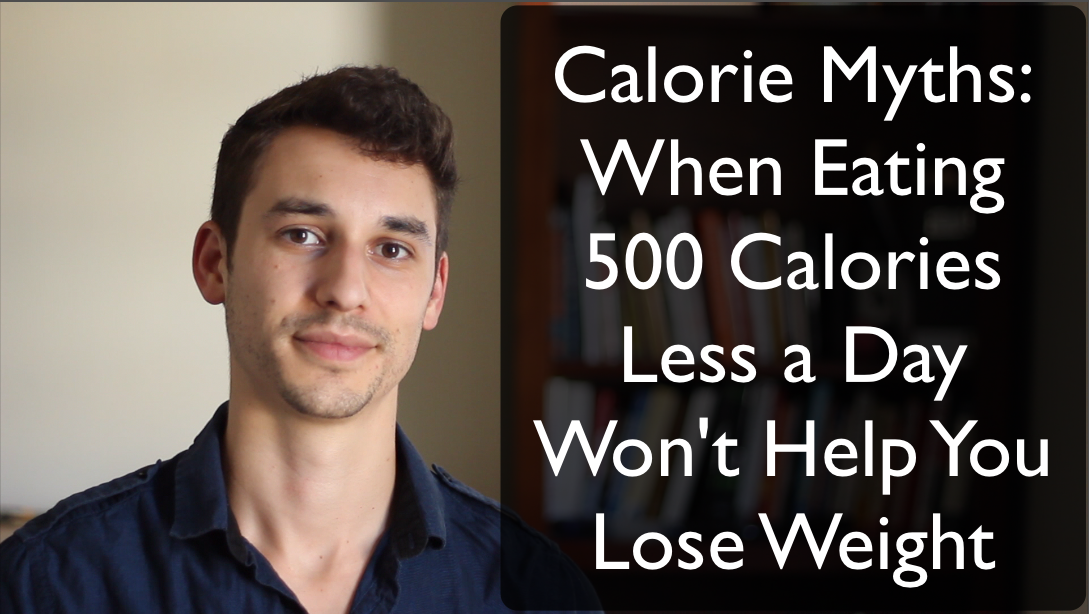
The Calorie Myth: When Eating 500 Less Calories A Day DOESN’T Work (And What to Do About It)
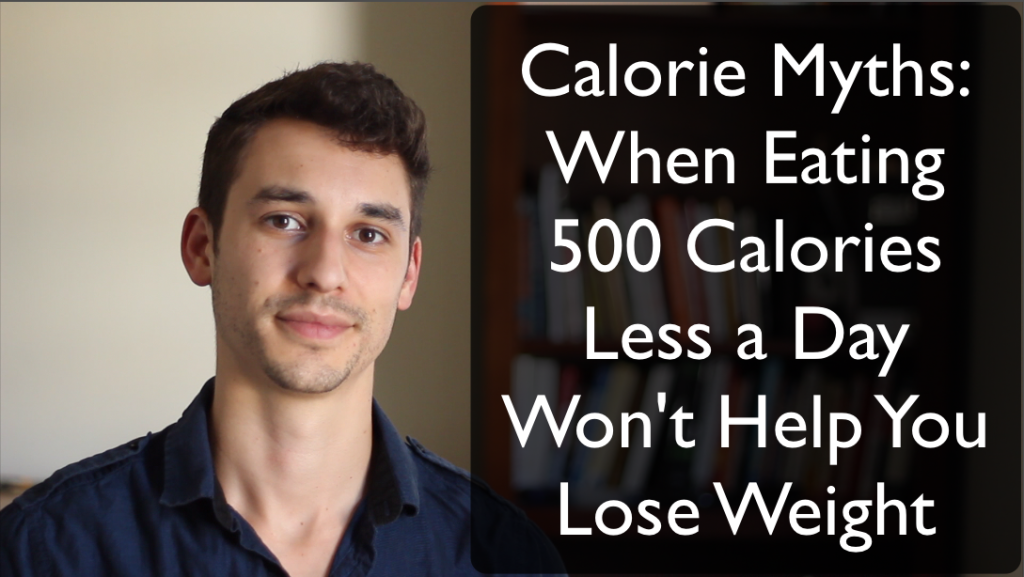
We’ve all heard the advice from a site with supposedly reputable people like WebMD:
“Just eat 500 fewer calories a day, you’ll lose 1-2 pounds a week, and you’ll eventually reach your goal.”
But the frustrating truth is that when you try it, it never seems to line up that way (and definitely not in the long run).
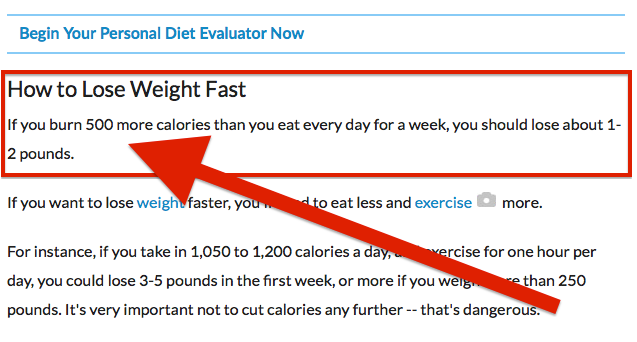
Lolz, that’s 5 less oreos a day! This should be easy… not…
But what if it doesn’t work at all?
And what if this entire model is a myth that hasn’t even been proven to work in reality?
The “500 Calories Less” Myth
Why It Just Doesn’t Work in Reality
I want to quickly tell you about a study done in the New England Journal of Medicine – because they wanted to test exactly this idea.
Does this “scientific fact” of reducing calories by 500 calories a day really produce that systematic, predictable, linear weight loss we hope for?
And if so, how much?
In the original study, researchers suggested that a person walking 1 mile per day, and thus burning around 100 calories, will lose more than 50 pounds over a period of 5 years.
So that’s based on this supposed mathematical formula for weight loss:
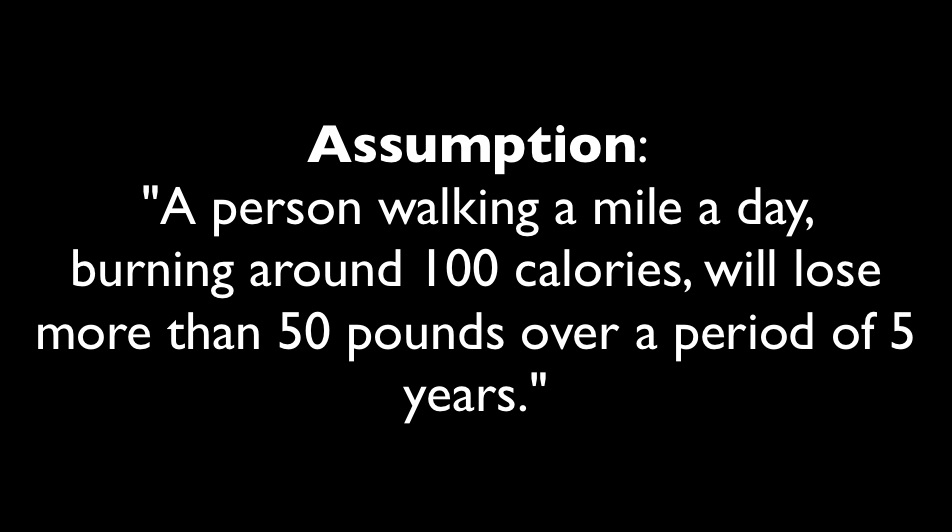
However, when they tested it, it only came out to around 10 pounds lost.
Later on, these researchers commented that this model of calories in calories out is around 50 years old – and this original statement was based on short term experiments, that were also performed on men on diets of less than 800 calories per day.
So in other words, maybe these results were realistic in the SHORT run, but not in the long run.
Maybe that’s the rate men were losing weight during that short period of being starved to death, but maybe the body compensated for that severe decrease in calories later – and thus slowed the weight loss down (since reality didn’t reflect that this actually works long term).
So if this doesn’t work… what do I really do?
Here’s the thing: we know that eating less works, but only up until a certain point.
You can only reduce your calories so much before you start feeling like crap, have no energy, your metabolism decreases, thyroid functioning worsens, and more.
So what am I supposed to do?
Be patient!
I realize this is literally the LAST thing you want to hear, but by far, and I mean by FAR, the #1 reason I see my own students and clients fail is due to lack of patience.
For example, I recently highlighted a modern health monk case study of Boris.
When he sent me this email, he had lost ~25 pounds. He has since followed up twice, and is now close to 50 pounds lost (down to 82kg from over 100kg).
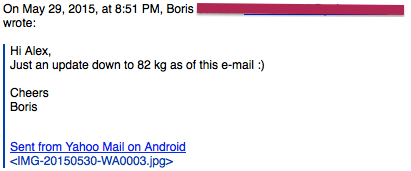
When I followed up with him, I wanted to know exactly what he did. I wanted to know what specific advice of mine he applied.
Here’s what he said: “I just kept doing the same stuff that worked originally but I was just more patient.”
“I stuck with the same principles and habits, which was at first frustrating because I plateaued for a few weeks and was wondering if maybe I needed to change the advice I was taking (or the program I was on), but I just kept being patient.”
So even though his weight loss slowed, he was still losing weight. And even though that weekly weigh-in he was doing may have not reflected tons of weight loss, the monthly one was showing weight loss.
At a high level, yes, eating less is going to work.
But at a certain point, there’s only a certain amount you can lower your calories before you start seeing negative health effects (e.g. the ones revolving around starvation).
I’ve had numerous conversations with people that spoke with me saying they couldn’t lose weight, and I found out they were eating starvation diets and exercising 1-2 hours a day. Having them eat more calories finally resulted in some weight loss for them.
Your Tiny Habit For Today
This might sound frustrating, but here’s the truth:
1. Be more patient.
People sometimes expect to lose the last 10 pounds in a month, but here’s realistically what that entails.
With 4-5 workouts a week, I would plan on 60-180 days to lose those last 10 pounds. And in some people, maybe it’ll take an entire year to lose those 10 pounds.
“Ughhhhh, are you serious?!?” Yeah I know. Sucks in the short run. But here’s the thing: at the end of the year, you’ve still achieved that lifetime goal. You’re still looking and feeling a heck of a lot better.. so who cares if it takes a few extra months than you planned?
Realistically, that’s what it’ll take.
2. Stop thinking so mathematically.
We’re not talking about increasing your salary here, getting a raise, or calculating how much money you’re going to make on your stocks. This is a more complex process which varies based on the person, hormones, age, stress, gender, and a lot more.
The more you think it’s going to be a pretty, linear math equation, the more you’ll be disappointed.
Instead, focus on getting 1% better each day – emphasize the process, and have fun so you can stay sane.
NEJM study: http://www.nejm.org/doi/full/10.1056/NEJMsa1208051

This thing about patience is SO TRUE! I am a lifelong dieter (i’ve written to you before). The one time i actually reached my goal (for 24 hours) was when i kept saying to myself “i have no choice………..i have to keep doing this and not give up” – it was all about patience. Especially when that darn scale fluctuates every single day and it seems like you’re not making any progress at all. Good advice!
It’s definitely frustrating Gabriele. I personally just like to give myself no chance to back out on my goals. If I want it, I remind myself that it’s all or nothing, then I suck it up and keep going haha.
This is why “cheat” days don’t work for me. If i cheat, i cheat for the next 12 months. I can’t cheat. It’s especially frustrating when you get older and you are on meds (beta-blockers) which slow down your heart…….and then knee problems which prevent really any normal exercise.
Actually yes it does work. It’s a misunderstanding which most people have because they think that if they just cut out 5-6 Oreos from their craps filled diet and that will help them lose weight! Nothing could be further from the truth if their diets are filled with crap anyway! This advice is free from a fitness instructor so take it if you want. ‘Eating 500 calories less’ means working out how many calories your body needs just to function for the day and subtracting 500. An average sedentary man needs around 2000-2600 (on AVERAGE!) A day so subtracting 500 would burn around 1 pound a week. This is because 1 pound of body fat is roughly 3500 calories (7×5=35/7×500=3500). You dint need to purchase a magic ebook for this to work. Be smart with portion control and don’t eat too much crap. It’s just that simple. Oh and someone mention ‘cheat days’ it’s not cheat days, it’s ‘cheat meals’! That’s one meal out of the week and not the whole day of eating crap.. another thing most people don’t understand which is pretty much common knowledge in and around the fitness world/training. Just trying to save you from downloading this magic book.
I agree!! It DOES work. It has become fashionable to say that calories don’t matter. I get what they’re trying to say…….. that eating clean matters more. The problem with paleo or low carb is that the food you DO eat is full of calories (butter, sauces, cheese, meat, etc) that is almost impossible to measure. You end up having no clue how much you’re eating. I have to “know” exactly what i’m eating and i cannot deviate from it one bit. I lost 100 pounds that exact same way. (of course i gained it all back again because i stopped counting calories). I’m back at it again. Only this time, because of knee problems, and age, i can’t walk as far or as often as i used to, so it’s much slower now. But it works. In addition, i just wanted to say that I don’t think Alex’s book is bad, he has a lot of great ideas and he’s trying to help all the millions of people who constantly struggle with their weight. Most people can’t be bothered to count their calories. For me it’s a necessity.
Hey Gabriele,
Totally understand – and you’re spot on. Counting calories DOES work – if it’s a sustainable strategy for the person, you know? Personally, with clients, we work on portion control (in a more intuitive fashion) without counting to achieve the same results. I agree that you can know 100% if you count calories, but if you focus on the right split of macronutrients, you can often get the same with a little practice (and without being as obsessive, which some people hate).
The most important thing is to do what works best for you.